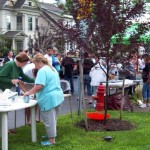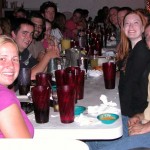Neighborly
Even when they disagree about the causes and reasons, many Christians agree that there is a lack of real community in most churches… even good churches. I think that stories and examples can help people understand what it means to live in community with others.
Dan (at “The Ekklesia in Southern Maine“) has written two posts dealing with “Neighbors in Limington”: “The Ice Storm” and “Cancer.” Both stories give a glimpse into community (neighborhood) life.
The church should demonstrate at least this much community… and more.
Thanks for stories and examples, Dan! Keep ’em comin’. (That’s southern for “write some more stuff.”)
We all just wanna be big rockstars
Thinking about my previous post called “Is the Church Top Heavy?“, I ran across this article by Ed Stetzer called “The Problem with Pastor as Rock Star.” Stetzer sees the same problem with too much emphasis on leadership (maybe) and especially on one man (the “Pastor”).
He says “rock star” pastors lead to problems in personal imbalance, hindering community, approval addiction, and selling out the church’s future. This is what he says about the problem of rockstar pastors “hindering community”:
If the church life revolves around one person’s speaking gift, it is incredible difficult to move to community. A community “won” to a single voice is not won to community, but to spectatorship. Thus, when pastors say, “it’s all about the weekend,” they tend to create an audience rather than a biblically functioning church community. This is still true if your church is an oft-criticized seeker megachurch or a your verse-by-verse preaching point. Either way, if you get thousands sitting in rows but can’t move them to sitting in circles, true community is hard to find.
As a guy who travels around speaking, I understand how quickly it can happen. For the last few weeks, I’ve spoken at a church close to my own house while the pastor is on a short sabbatical. But even in delivering biblical messages, I’m not engaging in biblical community with those people. It takes more than a stage to create a community. The temptation must be fought that a mass of people gathered to hear one person speak is equal to biblical community.
A gifted communicator can draw a crowd, but biblical community will sustain a congregation. A great orator is fun to have at worship, but cannot build community during the other six days and 23 hours of the week. Great preaching will be used by God to bring others to faith and sanctify God’s people, but it will also encourage the body to do life together on mission.
I’m not saying that every person in the community should have immediate access to the pastor. But I am saying that every pastor should be in some accountable biblical community.
I agree with Stetzer that this is a problem. I disagree with his solution, which seems to be for the pastor to be a little less of a rockstar.
What do you think the solution is? How would a church move from emphasizing leadership to emphasizing community?
The Lord’s Supper in Context
A few days ago, I was reading through parts of Margaret M. Mitchell’s Paul and the Rhetoric of Reconciliation: An Exegetical Investigation of the Language and Composition of 1 Corinthians (Louisville: Westminster/John Knox Press, 1991). I came across the section where she was discussing the Lord’s Supper in 1 Corinthians 11:17-34.
Mitchell points out that linguistically the entire passage focuses on the relational problems among the believers in Corinth:
Paul next turns to admonish the Corinthians for behavior in community worship which is even more divisive than the head wear disagreements. He begins this argument with his censure of their improper behavior first named in general terms, and then he describes specifically the abuse which he will treat… (1 Corinthians 11:20-22) Because he returns to this ecclesiological concern in 1 Corinthians 11:33-34, we conclude that the disunity of the church is the main topic of this argument, to which the tradition (1 Corinthians 11:23-26) is a response. (page 263)
If Mitchell is correct, and I believe that she is, then relational divisions during the Corinthian’s shared community meals is the reason that Paul wrote 1 Corinthians 11:17-34. Thus, we should read each part of that passage as building on Paul’s argument against these relational divisions.
For example, when Paul reiterates the account of Jesus’ last supper with his disciples in 1 Corinthians 11:23-26, he intended to admonish the Corinthians about the way they were treating one another. When he told the Corinthians to “let a person examine himself” in 1 Corinthians 11:28, it is in the context of communal relationships, not individual sin (although certainly individual sin causes problems with communal relationships). The same would be true about Paul’s teaching about judging ourselves in 1 Corinthians 11:31-32.
Paul began this section of Scripture by admonishing the Corinthians concerning their behavior when they came together to eat. He ends this section by again instructing the Corinthians about their behavior when they come together to eat. So, in context, we should understand that in this entire passage Paul is concerned about how the Corinthians are treating one another when they come together to share a meal.
We cannot pull parts of the passage out and choose to interpret that differently than the entire passage. Instead, the parts work together within the context of the whole.
Is this how you’ve heard this passage about the Lord’s Supper interpreted? How would it change traditional interpretations that you’ve heard?
Why is one covenant not enough?
According to Jesus, all of those who belong to God are now covenanted with God. For example, Jesus said that his blood represents this new covenant:
And he took a cup, and when he had given thanks he gave it to them, saying, “Drink of it, all of you, for this is my blood of the covenant, which is poured out for many for the forgiveness of sins.” (Matthew 26:27-28 ESV)
In the same way, Paul recognized that he currently served people who were under a new covenant with God:
Not that we are sufficient in ourselves to claim anything as coming from us, but our sufficiency is from God, who has made us competent to be ministers of a new covenant, not of the letter but of the Spirit. For the letter kills, but the Spirit gives life. (2 Corinthians 3:5-6 ESV)
Finally, the author of the book of Hebrews explains how Jesus (as our high priest) is a better mediator of this new covenant:
This makes Jesus the guarantor of a better covenant. (Hebrews 7:22 ESV)
So, all of those who are in Christ – who have been saved by the blood of Jesus Christ – are covenanted together with God… not based on their (our) ability to keep a covenant, but based on God’s promises (for example, see Hebrews 10:23).
We are in a covenant with God, and are therefore covenanted together with one another. Our covenant with God includes new familial relationships with others who are covenanted with God. Just as God is our father, his children (and all of his children) are our brothers and sisters. Our familial responsibilities toward one another are included in our relationship with God.
Thus, I cannot choose how I should treat someone who is in Christ. That relationship and those responsibilities are already ours because of our joint relationship with God.
So, the question that I’ve been struggling and wrestling with is this: If we are already covenanted with God and if we are already brothers and sisters with one another, then why do we need a separate “church covenant”?
A “church covenant” can only do two things: 1) It can remind of us our relationships and responsibilities which already exist, whether we have a covenant or not. And 2) it can specify with whom we share those relationships and responsibilities.
If we are relying on a “church covenant” for reason #1 above, then the “church covenant” is nothing more than a reminder of the new covenant in Christ. We are already covenanted with God through Christ, and therefore covenanted with all other people who are part of the same covenant. Thus, this is really not a “church covenant” but the new covenant.
The problem with #2 above is that our relationships and responsibilities extend to all brothers and sisters in Christ that God brings into our lives. If we use a “church covenant” to include some believers and exclude others, then we are dividing the body of Christ and making distinctions that only God can make. We are trying to choose who to love and who to serve. (Of course, this makes life much easier, but it doesn’t make it a life that lived according to the gospel.)
So, why do we need a “church covenant”? Why is one covenant (the new covenant in Christ) not enough?
Person of Peace
Felicity Dale (from “Simply Church“) has been writing a series of posts on Luke 10. Her latest post is called “How do you recognize a person of peace?”
She says:
A person of peace offers you hospitality. What does that look like in today’s society? You may not get invited into a home (although in my experience, that is not uncommon). Let’s say you have just started a new job, and after you’ve been there a few days, the lady in the office who everyone seems to revolve around says to you, “Some of us from the office go out for drinks on Fridays after work. Â Would you like to join us?” Â What has she done? She has offered you hospitality. Â She’s opening up her circle of friends to you.
Lately, our church has been talking about missional discipleship – although we don’t necessarily call it that. What is “missional discipleship”? It is going outside the walls and boundaries of the “church” not only to evangelism but even more to make disciples. It means meeting people where they are in their own environment and help them grow in maturity in Christ and then help them disciple their friends and neighbors and co-workers, etc.
Thus, the idea of finding a “person of peace” becomes very important. What do you think of Felicity’s description?
Building Relationships – Ethiopia Report 5
So, we went to Ethiopia to teach church leaders, to teach prisoners, to teach villagers, to teach teenagers… No. Not really. Those are some of the things that we did while we were in Ethiopia.
 We went to Ethiopia to build relationships. We went to Ethiopia so that we could get to know our brothers and sisters better. In the process, we taught. We also learned. And, for a short time, we shared our lives with one another.
We went to Ethiopia to build relationships. We went to Ethiopia so that we could get to know our brothers and sisters better. In the process, we taught. We also learned. And, for a short time, we shared our lives with one another.
We walked together and worked together. We ate injera and wat together and we drank buna (coffee) and chai (tea) together. We shared a bowl of fandisha (popcorn). We sat together and talked about their church and our church, their struggles and our struggles. We talked about evangelism and discipleship and Scripture and missions.
Where we agreed, we encouraged and strengthened one another. Where we disagreed, we loved and accepted one another. We worked together in Christ, not in ourselves and our ability to agree with one another.
 It’s true that we probably saw the best of their culture. We did not have to work for a living while we were there. We did not have to worry about where our next meal would come from. We did not have to be concerned about being beaten by our neighbors for proclaiming Christ.
It’s true that we probably saw the best of their culture. We did not have to work for a living while we were there. We did not have to worry about where our next meal would come from. We did not have to be concerned about being beaten by our neighbors for proclaiming Christ.
They showed us their best by serving us and showing us hospitality. In the process, we grew to know and love one another. Connections were made that will remain forever, whether or not we see each other again on this old world.
However, those relationships that were built also strengthen the resolve to see and work with one another again. I now know some people who live in Alaba, Ethiopia. Already, I wonder how they are doing. I wonder what is going on in their lives. I wonder what Nigussie is planning. I wonder what Martha is cooking. I wonder how Rani is doing in school.
 Because of our personal relationships with them, we’ve also begun to connect the church in Alaba, Ethiopia to our church here in North Carolina. We know the people that we’re praying for. When they need help, we know their names and faces and cares and struggles.
Because of our personal relationships with them, we’ve also begun to connect the church in Alaba, Ethiopia to our church here in North Carolina. We know the people that we’re praying for. When they need help, we know their names and faces and cares and struggles.
For Danny and me, our number one complaint was that we could not communicate better. We wish that we knew Amharic better or that they knew English together. So, we spend alot of time learning each other’s language. When (If God wills) we go back to Alaba, Ethiopia, it will be that much easier to communicate and get to know one another even better.
We learned that we all had needs and desires. We learned that we all had strengths and weaknesses. We learned that we could learn from one another. And, together, we were able to encourage one another to trust God.
 People are important. The people who are part of our church in North Carolina are important. The people who are part of the church in Alaba, Ethiopia are important. The people who live and work and shop next to me are important. God cares about them all.
People are important. The people who are part of our church in North Carolina are important. The people who are part of the church in Alaba, Ethiopia are important. The people who live and work and shop next to me are important. God cares about them all.
On this trip, God helped me understand a little better about how much he cares for people, and how important it is for me to build relationships with people – especially people who are different than me.
We were your apostles – Ethiopia Report 1
This is the first official report that I’ve published on my blog about our recent trip to Ethiopia. For the last few days, Danny (from “learning…“) and I have been putting together pictures and videos in preparation for a presentation report to our church yesterday.
 It was important to me to make a report to our church before I reported to everyone else via the web. Why? Well, because, through the work of the Holy Spirit, the church sent us as their representatives to the church and people in Alaba, Ethiopia.
It was important to me to make a report to our church before I reported to everyone else via the web. Why? Well, because, through the work of the Holy Spirit, the church sent us as their representatives to the church and people in Alaba, Ethiopia.
Our church has been involved with the church in Alaba for several years. A few years ago, someone gave us a large amount of money. As we were praying and trying to decide what to do with this money, several suggestions were offered: buy or build a building, buy some land, pay a pastor, etc. At the time, we were all still struggling with our understanding of the church and the role and function of the church and church leaders.
About a week after we received the money, Dave and BeckyLynn Black visited with us and told us about their work in Ethiopia. After further prayer and discussion, we decided to give the money to the church in Alaba so that they could buy a truck. The truck would be used to carry people and supplies as needed. It would also be used as an ambulance to carry sick or wounded people to Addis for medical attention. (By the way, we used the truck while we were in Ethiopia.)
The next year, the Black’s returned to our church and invited us to go to Ethiopia with them. Several of us wanted to go. I especially wanted to go. But, the timing was not right, and we felt that God was not directing us on this trip. However, we continued to support their work and pray for them and the people of Ethiopia, especially the church in Alaba.
 Last fall, the Black’s again returned to our church. Again, they invited us to go with them. Twelve people indicated that they were interested, but the Black’s could only take a few. So, after much prayer and consideration, Danny and I were chosen (by God and by the church, I think) to go to Ethiopia.
Last fall, the Black’s again returned to our church. Again, they invited us to go with them. Twelve people indicated that they were interested, but the Black’s could only take a few. So, after much prayer and consideration, Danny and I were chosen (by God and by the church, I think) to go to Ethiopia.
You see, in reality, we went both as God’s representatives and as representatives of Messiah Baptist Church, a people who already love and prayed for the church in Alaba, Ethiopia. We were apostles (messengers) to the church in Alaba from our church (Messiah Baptist Church).
During our first few days in Ethiopia, Danny and I discussed this passage from Philippians:
I have thought it necessary to send to you Epaphroditus my brother and fellow worker and fellow soldier, and your messenger and minister to my need, for he has been longing for you all and has been distressed because you heard that he was ill. Indeed he was ill, near to death. But God had mercy on him, and not only on him but on me also, lest I should have sorrow upon sorrow. I am the more eager to send him, therefore, that you may rejoice at seeing him again, and that I may be less anxious. So receive him in the Lord with all joy, and honor such men, for he nearly died for the work of Christ, risking his life to complete what was lacking in your service to me. (Philippians 2:25-30 ESV)
No, neither Danny nor I came close to dying. But, like Epaphroditus, we were sent as messengers (apostles) by our church. I’m sure that many, many more members of our church would love to have gone to Ethiopia to love on and care for and teach and learn from their brothers and sisters in Alaba. But, they could not all go. So, they all sent Danny and me “to complete what was lacking” in their own service and love for the people of Alaba.

 We were their apostles… their messengers to the church in Alaba, Ethiopia. And throughout our trip we continually reminded ourselves and the people that we met that we represented many, many people who loved the people of Alaba.
We were their apostles… their messengers to the church in Alaba, Ethiopia. And throughout our trip we continually reminded ourselves and the people that we met that we represented many, many people who loved the people of Alaba.
Here are a couple of videos of the main church in Alaba and the Zobechame church in Alaba sending their greetings back to our church in America.
Alaba Church #1 sending their greetings back to the church in America from Alan Knox on Vimeo.
Zobechame Church in Alaba sending their greetings back to the church in America from Alan Knox on Vimeo.
One of my favorite Ethiopia pics
This is one of my favorite pictures from Ethiopia. At least, it’s probably in my top 100 favorite pictures. 🙂
Seriously, I really like this picture. I’ll explain to our church tomorrow why I like this picture, and I’ll explain on my blog next week.
Until then, anyone (besides Danny or Dave Black) wanna guess why this is one of my favorite pics? (Click the image below for a larger view.)
Southern Maine Update
My friend Dan from Canada… I mean Maine… (at “The Ekklesia in Southern Maine“) was very nice to continually remind everyone to pray for Danny and me while we were in Ethiopia. If you remember (see my post “Looking for Ekklesia in Southern Maine“), Dan and his wife Stephanie has been seeking Christian fellowship in the Portland, Maine area.
Now, according to Dan’s update, it seems that God is bringing people into their lives. See Dan’s post “Weekly Update: 07.25.10.” In the midst of thunderstorms and other struggles, Dan and Stephanie are meeting other Christians. And, he says that they are learning that all of life (including thunderstorms) impacts our fellowship with other brothers and sisters in Christ.
By the way, Dan was quite the blogger while I was gone. If you haven’t read them yet, check out these posts:
Keep blogging, Dan!
Grocery Store or Garden?
Arthur (from “the voice of one crying out in suburbia“) is at it again. This time, he’s talking about “Gospel Grocery Stores.” Arthur quotes a book in comparing many churches to grocery stores, providing produce to anonymous people.
Instead, he says, churches should be more like community gardens, where the people work together to produce the fruit of their labor. He says:
The church should be more like a community garden and less like a supermarket. That might mean we need to spend a lot of time together. We might get a bit dirty in the process and there are going to be disappointments. Things might not turn out like we hope. If you have a garden and plant tomatoes, sometimes some of the tomatoes will have bugs in them or turn brown or fall off the vine before they are ripe. Sometimes it rains too much and sometimes it rains too little.
Yeah, Arthur’s right. It’s hard work.I wonder if the “hard work” is the reason that many people choose to skip that part and jump straight to the fruit of another’s labor?











